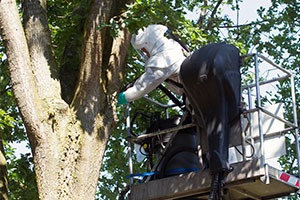Trading outdoors is a great way to be involved in local events and sell produce, or just to raise the profile of your business. Maybe you're planning some onsite outdoor events and need some extra covered space. There’s no doubt that a good-quality gazebo will become your best friend on days like these. Stephen Evans, managing director at Market Gazebo World, tells us about his range and how… Read more
'We need biosecurity initiatives which will work'
Hossein Arshadi is a divisional director at Hillier Nurseries. Here, he discusses why existing biosecurity initiatives will not work in practice and what is still needed from the government, the media and the public to prevent a very costly breakdown in biosecurity.
Biosecurity Q&A with Hillier Nurseries
Q: In recent years there have been several plant health and biosecurity threats to UK trees and plants - for example, Ash dieback, Xylella and Oak Processionary Moth. How concerned is the industry?
There are many wide-ranging businesses within the industry. Growers (or, real growers) are very concerned, others less so and some not at all.
Q: Are the steps DEFRA are taking adequate to halt the spread of pests and diseases?
No, I don’t think so. Look at the track record for the last 20 years; there has been a more than 600% increase in new pests arriving into the UK compared with the previous 20 years. 
Q: What should DEFRA be doing in your opinion?
DEFRA biosecurity objectives should be putting in place systems that prevent host plants arriving in the UK (i.e. by banning host plants), rather than allowing the import of host plants and trying to identify or control them. This is a risky and very expensive strategy.
Q: There have been several biosecurity initiatives in the industry. What do you think of them?
I know of two initiatives. One aims to work by quarantining imported trees for a period of 1 year. The other is the HTA’s Plant Health Assurance Scheme (PHAS). Both of these initiatives lack detail as to how they are supposed to work in all circumstances. A blueprint is needed to show how these schemes would work.
Looking at the quarantine initiative, quarantine by definition means isolation. Therefore, trees that are in quarantine need to be in a place where there is zero chance of cross-contamination. I am not sure this scenario exists. One cannot today quarantine thousands of trees in the same area, or even close to where other trees are grown and shipped out daily.
PHAS is a scheme for traceability of host plants that will be audited. The scheme requires records to be kept from the plant’s place of origin all the way to its final planting location. PHAS requires plant importers to inform FERA (the Food and Environment Research Agency) before plants arrive so they can be inspected and detailed records kept as to where these plants will go. In addition, many other hygiene and husbandry records are required. In order for PHAS to work, all businesses without exception who handle and import plants must join the scheme. This includes nurseries, garden retailers, landscape contractors, traders, main contractors, online traders, local authorities, the Forestry Commission and any others who come into contact with plants.
As we now know, it only took one oak tree with Oak Processionary Moth to contaminate thousands of trees. This continues to cost millions of pounds to keep under control.
There are pests and diseases that have a latency period of 18 months or more, during which time plants show no symptoms even when they are already infected, making detection difficult.
How would either of these schemes work with retailers, for example, who sell millions of imported plants each week?
Q: Some say that these initiatives are better than nothing. Do you share this view?
I don’t believe these initiatives are better than nothing. They create a false sense of security.
Q: What about Xylella?
Xylella is one of the diseases that has a latency period and hundreds of host plants. If it arrives, it will be impossible to control.
Q: What are Hillier’s biosecurity objectives?
Zero tolerance. We will not import plants that are host to major pests and diseases from infected areas identified by DEFRA.
Q: Are you against importing plants in general?
No, not at all. We are only against importing plants that carry major risks to the industry and the wider environment.
Q: Why doesn’t the UK follow the biosecurity example of countries like New Zealand and Australia?
This has been raised before within the industry. The problem is political, as well as our location.
Q: Do we need to consider the impacts of climate change when considering how we deal with biosecurity  challenges going forwards?
challenges going forwards?
Yes, we should. If global temperatures rise, some species of insect will survive and breed better in our new warmer climate than they do currently.
Q: It is reported that in England in 2016/17, the government spent an estimated £922,000 on biosecurity measures relating to non-invasive species. Will this be a big enough budget going forward?
If this figure is correct, it seems to be quite modest. I’m not sure if it includes Local Authorities expenditure maintaining the trees affected by Oak Processionary Moth and Ash dieback. If so, it is far too little.
If Xylella spreads in the UK, we will need tens of millions of pounds to manage and contain the spread of this disease. In my opinion, prevention is better than cure. It is just common sense!
Q: What should the industry be doing to influence the behaviour of the public in relation to biosecurity?
This is not a task the nursery industry can tackle on its own. It is a collective responsibility of the industry, the government and the media. They need to educate and inform the public and plant buyers of the seriousness of the risks. Hopefully, this will reduce the demand for imported, risky host plants. This may also lead to more UK nurseries growing such plants themselves – i.e. import substitution.
Q: What policy support from the government would you like to see to help bolster biosecurity?
We need very clear biosecurity objectives, not ones that are woolly and try to please everybody. The government should also set aside a compensation package to support nurseries who may suffer financially through no fault of their own. There should also be hefty fines for any businesses who don’t follow the rules.
Q: What can individuals do?
Any individual buying plants can review the DEFRA Plant Health Risk Register and avoid buying imported plants that are on the list.
See defra.gov.uk to find out which plants are on the register.
Photo: Oak Processionary Moth Removal – credit Ronald Wilfred Jansen / Shutterstock.com
- Log in to post comments


